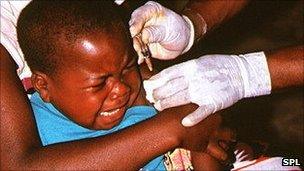Malaria vaccine trial results promising
- Published
- comments

The results from the trial of the GSK vaccine are promising
Some much-anticipated results have come in from a major trial of a vaccine against malaria.
The RTS,S vaccine, developed by GlaxoSmithKline (GSK), has been trialled in seven African countries. The first phase three results, published online in the New England Journal of Medicine, show that the vaccine cut the risk of malaria infection and several malaria - by about half.
In the normal scheme of things a vaccine that cut cases of infection by half would be considered a failure. But the numbers affected by malaria are so high - it is one of the biggest killers of children in Africa - that the World Health Organisation has said this vaccine trial is worth pursuing.
The philanthropist Bill Gates, who has given billions of dollars to fund vaccines in the developing world, was upbeat: "It is very promising. The very fact that this vaccine works gives us data about how to build better vaccines and it gives us a tool to combine with bed-nets, spraying, mosquito killing - all these different interventions - that will help us bring the number of deaths down quite a bit."
Concerns
The upbeat message about the results has to be tempered by a couple of things.
Firstly, there were more side-effects in the group vaccinated against malaria, than in the control group who received a rabies vaccine. For example, there were cases of meningitis and seizures. This will need to be monitored carefully.
Second, there is some evidence that the effectiveness of the malaria vaccine might have waned over a year.
Andrew Witty, the CEO of GSK, told me that the trial would continue to follow thousands of children in the future.
He said: "Over the next couple of years we will get a very clear view on what's really happening with protection. Is it waning or is it that people are acquiring their natural immunity. Do we need a booster dose or not? All that will become clear."
Bed nets and insecticides will remain vital in the fight against malaria - the vaccine is no magic bullet - but even a jab that was 50% effective could save huge numbers of lives in the years to come.
You can watch my interview with Andrew Witty here.
GlaxoSmithKline's Andrew Witty lauded the work as an "incredible scientific achievement"